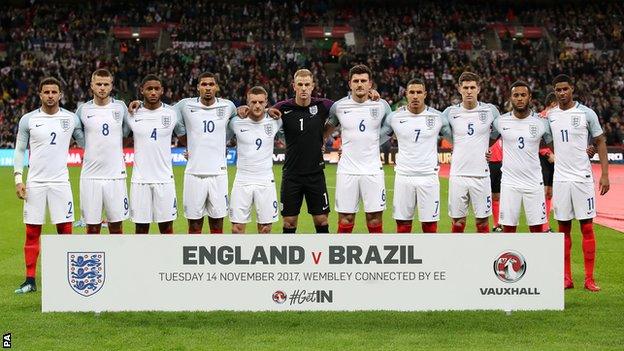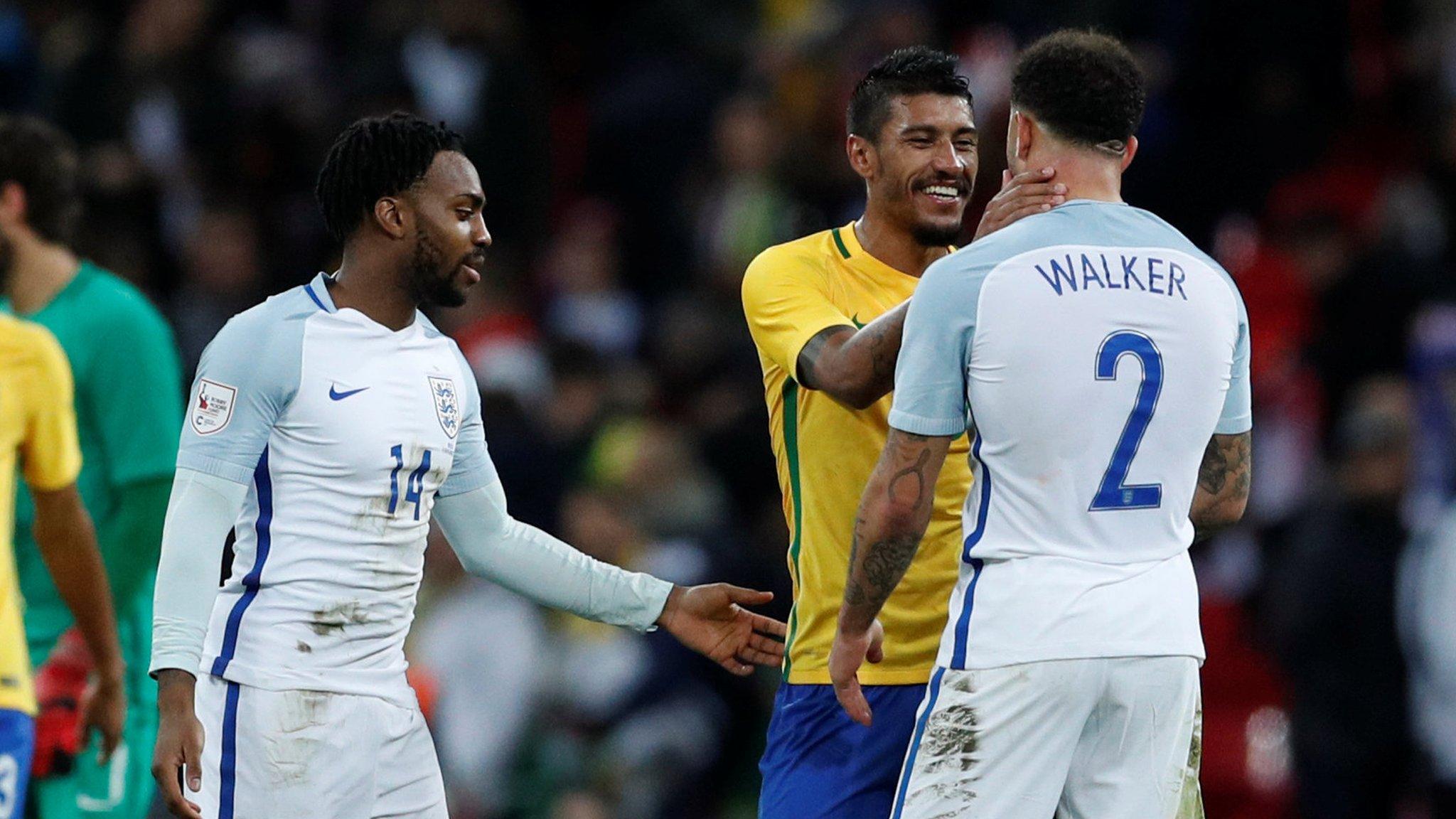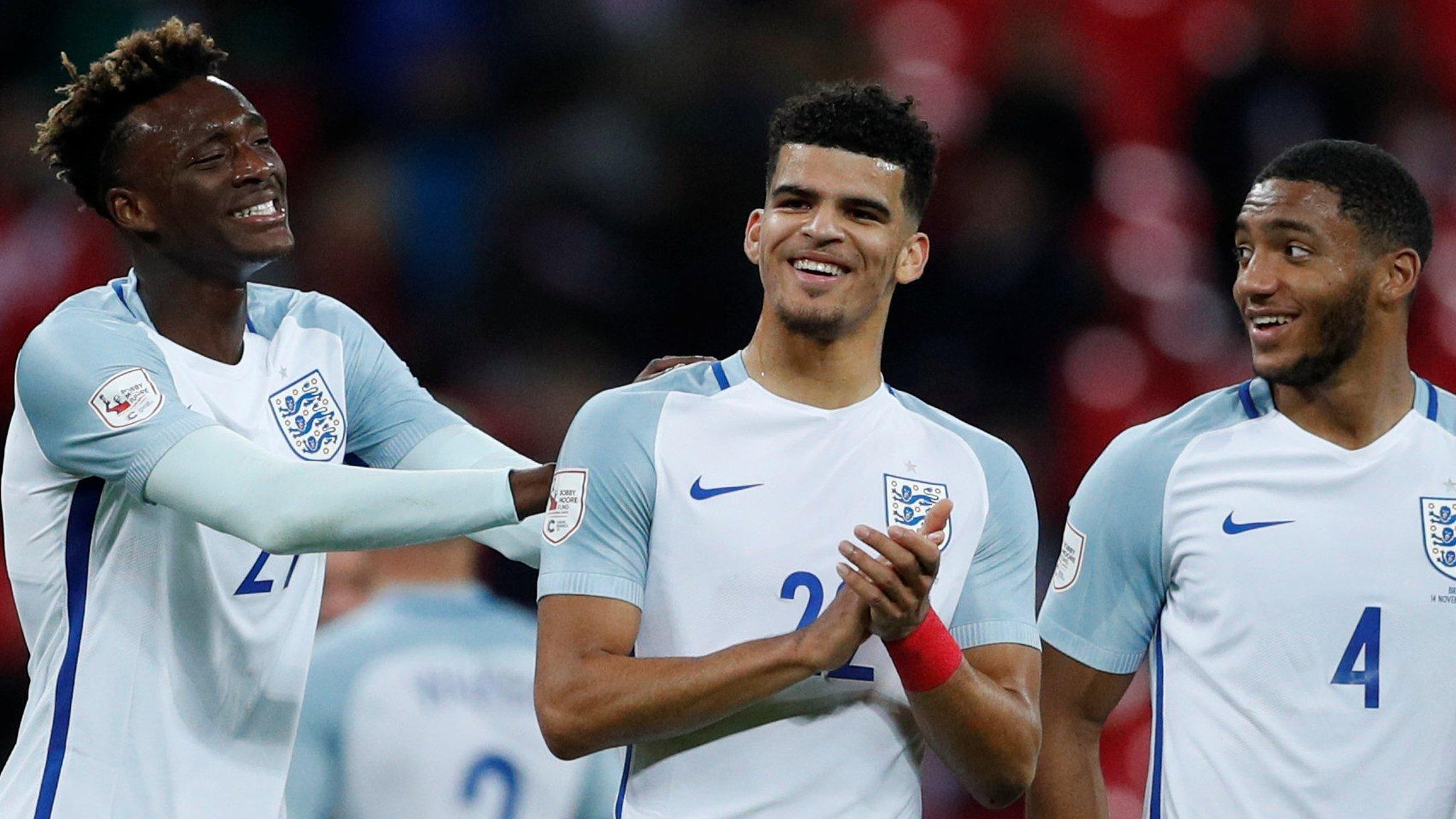Gareth Southgate: How England's manager is staging a quiet revolution
- Published
- comments
England can take huge belief - Southgate
When Gareth Southgate was appointed permanent England manager almost a year ago, after a four-game trial transition in the aftermath of Sam Allardyce's 67-day tenure, he found familiar labels attached to his Football Association blazer.
The 47-year-old was regarded by many as the soft option - safe hands and squeaky clean - after Allardyce left, caught up in a newspaper sting having taken charge of just one World Cup qualifying win in Slovakia.
Southgate was a product of the FA's system, having been head of elite development for 18 months from January 2011 and also coaching the under-21s for three years before stepping into the job vacated by Allardyce.
He was also tagged with a description that would understandably infuriate him - a mature and personable nature leading to fears Southgate was "too nice", external for the ruthless cut and thrust of international football.
In his first 12 months, England's displays have hardly been sparkling, even though the goal of qualification for the 2018 World Cup has been secured.
Since then, Germany and Brazil have been held to goalless draws at Wembley in performances which add to the feeling Southgate is ripping off unwanted labels attached to him a year ago as he seeks to prove he is his own man.
Tough calls? No problem
Southgate's England in numbers | ||
|---|---|---|
Matches | Players used | Number of debuts |
14 | 44 | 14 |
Southgate's results and performances have been underwhelming in his first year but he has been shaping his own side and has shown the courage of his convictions to take the tough decisions - including dropping his captain and England's record goalscorer Wayne Rooney for the World Cup qualifier in Slovenia.
It was a call handled with sensitivity as well as hard-headedness by Southgate, showing awareness of Rooney's history with the England team when finally deciding to exclude him.
Southgate also overlooked Rooney for the World Cup qualifier in Scotland and the friendly in France in June on the grounds of other players being in better form. There was no sentiment or making the easy choice by recalling the player who has been a symbol for England for well over a decade.
It is, however, the less high-profile decisions that demonstrate how Southgate is determined to make his mark and conduct a quiet revolution, a subtle changing of England's guard.
When Manchester United's Chris Smalling was left out of an experimental squad for the Wembley friendlies with Germany and Brazil, Southgate was brutally honest when questioned why.
Asked whether Smalling struggles playing the ball out from the back, he responded: "No, I think he can. We have players like John Stones and Eric Dier and Harry Maguire who are even better."
A simple explanation. And a calculating one.
Liverpool pair Daniel Sturridge and Alex Oxlade-Chamberlain had previously been in Southgate's plans but were jettisoned for the friendlies - and not considered for a recall even when the manager was faced with an epidemic of absentees.
Arsenal's Jack Wilshere was also touted after showing flashes of his best form but Southgate was unmoved and clearly wants harder evidence before thinking again about a player who has been constantly troubled by injuries.
Wilshere's Arsenal team-mate Theo Walcott has long since been shown the door, despite starting in Southgate's first match in interim charge, the 2-0 World Cup qualifying win over Malta in October last year.
Southgate, irrespective of lacklustre performances, possesses an inner steel that is increasingly visible with growing confidence and greater experience.
He will face even bigger decisions as the countdown to Russia continues - but he has already shown he will be England manager on his terms.
Unexpected selections - but a clear vision

Joe Gomez made his first England start against Brazil, one of a series of bold selections by Southgate
England's youthful undercard is in vibrant and successful mood, having won both the U20 and U17 World Cups - and Southgate seems only too willing to embrace the idea of building not just the long-term future, but also perhaps for next summer in Russia.
Harry Winks made his England debut after only four Premier League starts for Tottenham in the final qualifier in Lithuania and impressed enough to be mentioned as a potential interloper into a central midfield partnership of Eric Dier and Jordan Henderson that is long on experience but short on creation.
And there was understandable excitement about the performances of Everton goalkeeper Jordan Pickford, 23, and 21-year-old Ruben Loftus-Cheek, on loan from Chelsea at Crystal Palace, against Germany.
Southgate's hand has been forced by injury but he was still bold enough to go with youth for these friendlies, ignoring the safer route of recalling the road-tested players he had initially excluded.
Tammy Abraham - another Chelsea loanee at Swansea - did not look ready against Germany but that is no shame on him or Southgate. The time was right for experimentation.
And he also showed a willingness to think beyond more established internationals by bringing in Liverpool's 20-year-old striker Dominic Solanke, Bournemouth's Lewis Cook, also 20, and 21-year-old Norwich goalkeeper Angus Gunn, on loan from Manchester City, to his reconstructed squad for Tuesday's friendly against Brazil.
Everton's Dominic Calvert-Lewin, another 20-year-old, was also in contention and may well get his chance before the World Cup.
Manchester United's Marcus Rashford, only just 20 himself, looks increasingly like a starter in Russia, while Spurs' Dele Alli is one of England's main hopes at 21.
Southgate has made it clear he wants his England side to be fearless - and fearlessness and refusal to bend under the weight of the shirt can often be found in youth.
"We'd love to have a team full of players who have won the Champions League but we haven't got that," said the former Middlesbrough manager. "But I want players who will be fearless, prepared to have the ball and show what they are capable of on the biggest stage.
"You'll always be judged on a tournament, but make the decisions that are right for the team or club you're managing. Not everybody might work that way, but the reason I came into the FA to shadow Sir Trevor Brooking was because I care about young English players and England. I believe in the cause."
England under-21 coach Aidy Boothroyd has, not surprisingly, praised Southgate's willingness to take a risk on youth.
"The guys like Dominic Solanke, Tammy Abraham and Lewis Cook have played in a penalty shootout, played against the likes of Germany and Brazil," he told BBC Radio 5 live. "They have won things together and they understand what is needed to win at international level.
"When you consider they have been with us since 15 or 16, the games programme they have is a really great teaching lesson in what they are going to face later on.
"I hope England fans can see that we have some good young players who just need the opportunity to show what they are about and Gareth is one of the few people doing that."
Southgate will not plunge a handful of youngsters into his first starting line-up in Russia but as someone steeped in the philosophy of the England "DNA" espoused at St. George's Park, he is clearly not only observing a line of succession through the national teams but is prepared to act upon it.
Doing the job his own way
England managers' records after 13 months in the job | |||||
|---|---|---|---|---|---|
Manager | Games | Wins | Draws | Losses | Win % |
Winterbottom | 10 | 8 | 1 | 1 | 80 |
Ramsey | 10 | 6 | 1 | 3 | 60 |
Revie | 11 | 6 | 4 | 1 | 55 |
Greenwood | 11 | 7 | 3 | 1 | 64 |
Robson | 14 | 7 | 5 | 2 | 50 |
Taylor | 14 | 10 | 3 | 1 | 71 |
Venables | 8 | 4 | 3 | 1 | 50 |
Hoddle | 13 | 10 | 1 | 2 | 77 |
Keegan | 10 | 4 | 5 | 1 | 40 |
Eriksson | 12 | 7 | 3 | 2 | 58 |
McClaren | 14 | 7 | 4 | 3 | 50 |
Capello | 12 | 9 | 1 | 2 | 75 |
Hodgson | 17 | 9 | 7 | 1 | 53 |
Southgate | 14 | 7 | 5 | 2 | 50 |
Southgate's switch to a three-man defensive system once England had qualified for the World Cup suggested he had separated that part of his mission, effectively phase one of his job, from the actual tournament itself.
Southgate used a conventional back four until he could safely plot his path to Russia - and since then has appeared increasingly convinced a three-man central defence with full-backs pushing on is England's way forward.
It is a conviction in sharp contrast to one of his predecessors Roy Hodgson, who appeared to become detached from his own principles of organisation, organisation, organisation in the quest to prove he could be expansive and offer the public a previously unseen side to his essentially conservative approach.
Hodgson was at his best at Euro 2012, a tournament that took place just weeks after his appointment when he was relying on his natural coaching and tactical instincts. Later, at the 2014 World Cup and Euro 2016, he was scrambling for a formula, both competitions ending in a fiasco for England, resulting in his resignation after the last-16 exit to minnows Iceland in Nice.
Southgate is using the three-man system now and is determined to give all of his candidates, such as Stones, Maguire, Gary Cahill, Phil Jones, Michael Keane and even Dier, time. Liverpool's Joe Gomez has been playing at right-back for his club but has also shown the capability to impress in the centre, excelling during his full debut against Brazil.
He is clear in his tactical thinking and is determined his players will also have that clarity. He believes this system will stop England turning the ball over to the opposition as much as they have in the past.
"In terms of the way we'd want to play from the back, I think three at the back is a better option," he said.
"The system gives us good stability and it gives us easier solutions for our midfield players as well.
"You have such little time to work with the players that the more clarity they have under pressure, the likelier it is they will know what to fall back on."
Southgate's limited time with his squad offers an element of risk to a change of system - but once again it is proof he will stand or fall doing it his way.
- Published7 November 2017

- Published14 November 2017
